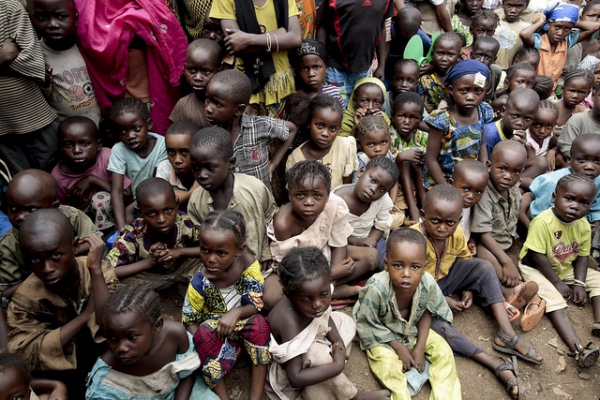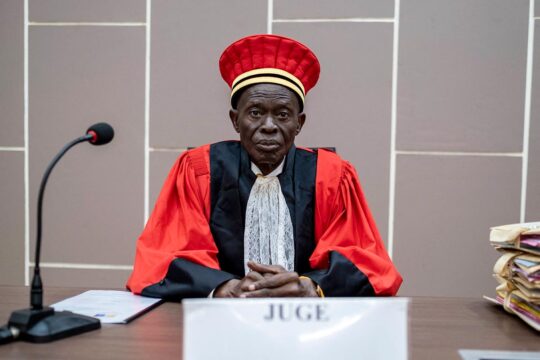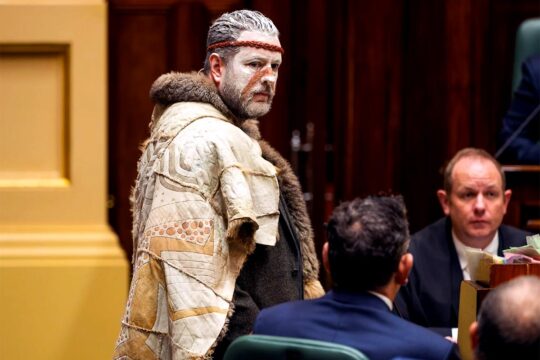Normal activities have resumed in Bangui since the beginning of the week, with banks and shops reopening, taxis, minibuses and motorcycle taxis working again. But the Central African Republic capital remains haunted by inter-communal violence that paralyzed it at the end of last month, leaving 61 people dead and more than 300 injured according to the government.
This violence broke out on September 26 after the murder of a Moslem motorcycle taxi driver. Angry demonstrators put up roadblocks in the city, calling for the departure of transitional president Catherine Samba-Panza. Returning early from New York where she was attending the 70th UN General Assembly, Samba-Panza said there had been an attempted coup, and declared three days of national mourning.
Given the situation, the constitutional referendum planned for October 4 did not take place. It was meant to kick off a series of elections to end the two-year transition. No new date has yet been announced for the referendum, nor for legislative and presidential elections scheduled for next Sunday, October 18.
The National Elections Authority (ANE) has not yet made any official statement. “At the ANE, nothing has yet been decided,” the authority’s spokeswoman Françoise Sackanot told Radio Ndeke Luka. “This crisis has changed everything. We are waiting to see the outcome of national consultations before drawing up a new calendar.”
The CAR’s main partners (France, the European Union, United States and African Union) had on June 16 approved the calendar proposed by the elections strategy committee. Legislative and presidential elections were to take place on October 18, with a possible second round on November 22. Before that, a constitutional referendum was supposed to take place on October 4.
Electoral “slippage”
On the eve of the planned referendum date, the electoral census launched in July was still not finished, especially in zones still held by militia. The census of Central African refugees in neighbouring countries was finished for the most part, but the ANE had still not published the entire electoral list. Central Africans who fled their country were authorized to vote in August, following a heated debate.
Aware that the international community wants elections before the end of the year, ANE President Dieudonné Kombo spoke in favour of “some slippage” in the electoral calendar. He carefully avoided saying elections should be “postponed”, something many politicians and civil society leaders are saying but which France and the United Nations do not want to hear.
Elections also cost money. Despite some efforts, the international community still needs to provide more funds. The total budget (revised downward) is estimated at about 10 billion CFA francs (about 15 million Euros), and is far from covered.
But the main donors, including the United States, are sticking to their position. “The recent events in Bangui have not had much impact on election preparations,” Chargé d'Affaires at the US embassy in Bangui David Brown told Radio Ndeke Luka. “It is clear that more than 1.4 million Central Africans have already registered to vote, which shows they want elections. So we will continue to support this process so that the elections can be held on time.”
Returning from New York, transition President Catherine Samba-Panza announced wide consultations with the “vital Forces of the Nation” to find solutions, although she did not announce a date. She stressed the need to disarm the militia, thus reflecting something wanted by most Central Africans who criticize the foreign forces in CAR for not fully playing their role. “The President and her office are working on these consultations, as is my office,” transition Prime Minister Mahamat Kamoun told Radio Ndeke Luka. “We are going to look at the proposals and decide the date and manner of this much- needed dialogue.”
Inclusive dialogue
So will this be another “National Forum” like the one held in Bangui in May? In any case, the political class is calling for inclusive dialogue on the electoral calendar. “On the issue of the election process, everyone needs to contribute,” says Gina Sanzé, spokesperson for the Coordination of political parties and associations, which groups some 30 political entities. “The President needs to put inclusivity first.”
The KNK party of former president François Bozizé thinks this inclusive dialogue should take place in Brazzaville, under the auspices of the international mediator, Congolese President Denis Sassou Nguesso. In a statement, the KNK slammed the “hardened determination” of the international community and the transition authorities to “exclude the main players in the Central African crisis, namely former heads of State François Bozizé Yangouvonda and Michel Djotodia”, both of whom are in exile. The KNK remains active in Bangui despite the fact that Bozizé is out of the country.
Could it be that the two ex-presidents fomented the latest violence in Bangui, as suggested by the transition government, to regain a voice in the process?
The Central African Republic has been almost constantly unstable since its independence from France in 1960. For more than two years it has been prey to an unprecedented crisis marked by widespread, grave abuses on a scale never seen in the country before.
François Bozizé was ousted in March 2013 by Seleka rebels who bled the country for 10 months. The Seleka, a disparate coalition that was hard to control, in turn lost power as transition president Michel Djotodia was forced to step down under international pressure on January 10, 2014. Another militia, the Anti-balaka which started as civil defence, almost immediately started spreading more terror in the country, targeting attacks particularly at Moslems.







